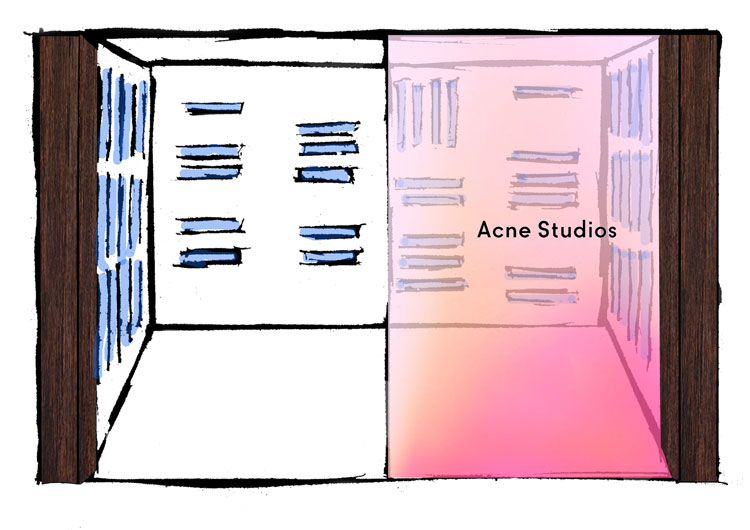BA students from across LCF’s business courses had the opportunity to apply for Fashion Matters BA Final Collection or Research Awards, to help support their final collection or project. The winners have been announced, and this year include Leah Haines and Axelle Parmentier from the BA (Hons) Fashion Business course, and Taavi Tiidt from BA (Hons) Fashion Visual Merchandising and Branding.

Sketch by Taavi Tiidt
How did you find the award application process?
Leah: The process was extremely quick and easy, it only took a couple of minutes to complete the application.
Axelle: I found the application process easy.
Taavi: The application process was fairly easy and straight forward. I actually mixed up the dates by mistake and started my application 30 minutes before the deadline! It was probably the
speediest typing I have ever done and there was definitely the pressure of missing this great opportunity.
How will this award help you realise your final project?
Leah: The award will help to financially support my research, and as well as this it will help with printing and binding my final major project.
Axelle: The award will help me to buy the materials I need to start with, and also help to reduce the bank loan I am hoping to apply for.
Taavi: I think the award gives me more freedom to collaborate with people from the industry. It also contributes to the final outcome, making me able to produce work which is of a higher standard, something that I am very proud of and able to present to my future employers.
Tell us why fashion matters, and how your work reflects this idea?
Leah: My work is based on a new supply chain method for the high street that will help to change consumer attitudes and buying habits towards fast fashion, as well as reducing the clothing waste footprint in the UK annually. Clothing waste is an epidemic in the UK – so many unwanted and unused clothes sit in wardrobes because of over purchasing, and ultimately end up in the bin. This problem needs to be addressed from the core to ensure the fashion industry can sustain itself and not ruin the environment in the process.
Axelle: Fred Davis said that whether an individual is purposely dressing in a way or not, clothing is politically charged. Since politics rules so much in our society, fashion matters in that sense.
Taavi: Fashion matters to the economy, to society and to each of us personally. For some observers, fashion is still regarded as simultaneously superficial, frivolous and indulgent, a private-members’ club run buy well-dressed individuals, who just couldn’t get a ‘real job’. It is often overlooked that people in the fashion industry are extremely intelligent, passionate and talented, and how much work, commitment, thought and knowledge goes into what they do, whether it is designing clothes or creating a business strategy. Fashion also gives us the possibility to display our individuality and singularity through experimentation with dress and appearance, allowing us to create personal images in order to situate the self and send out culturally-coded messages to others, telling the story of who we are or who we want to be faster than anything else.

Presentation board by Taavi Tiidt
Tell us about your final project?
Leah: My project aims to tackle the clothing waste epidemic and ultimately change consumers purchasing habits, by looking at a made to order supply chain method in the high street. As a store, it will have a no waste policy, the consumer will be offered the choice to customise their clothing and make design decisions not normally offered to them. By involving the consumer, I hope the item of clothing will be kept for longer and encourage slow fashion habits.
Axelle: I’m working on a genderless fashion label. I want people to be able to enjoy and discover fashion without any gender border – it is about inclusion and not segregation.
Taavi: My project is called Symbols of Power: branding distant past and present. The aim of it is to investigate and explore five luxury fashion items that have historically become symbols of power, and to identify how these non-verbally communicated meanings have been understood by modern societies, how they currently affect contemporary luxury consumption and how these specific tropes are used in luxury fashion branding. By investigating the symbolic meaning and evolution of rings, crowns/ tiaras, shoes, watches and handbags within two specific time periods – the late Baroque (1660-1715) in Central Europe and the present day (1995-2017) in Western societies, I will analyse how and why these luxury fashion items are symbolic and how they are perceived by the society. An outcome of this project is five photographs and a short fashion film. The visual outcome aims to challenge the mind by juxtaposing both contemporary and historic luxury items with identifiers of Baroque, highlighting and revealing the motivations behind luxury consumption in the distant past and present day.

